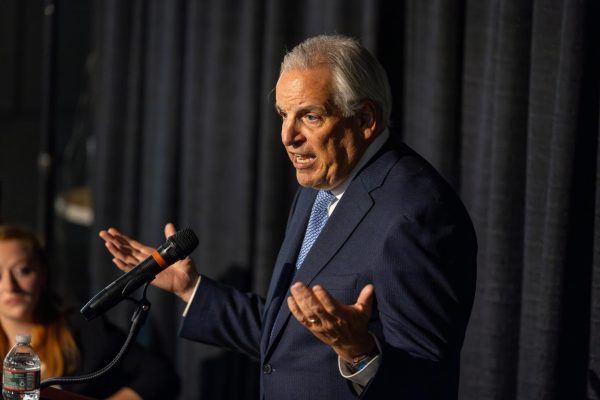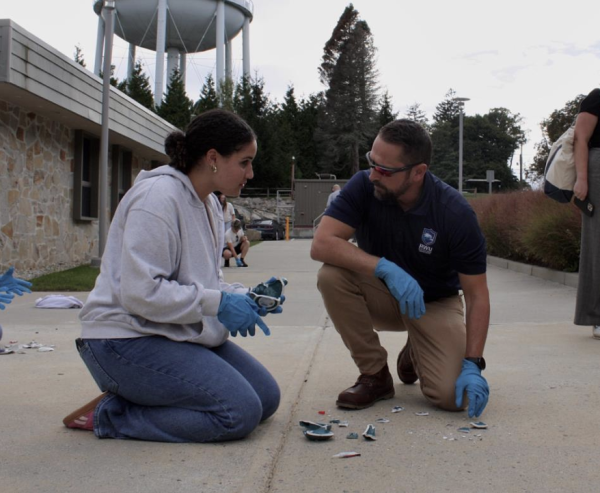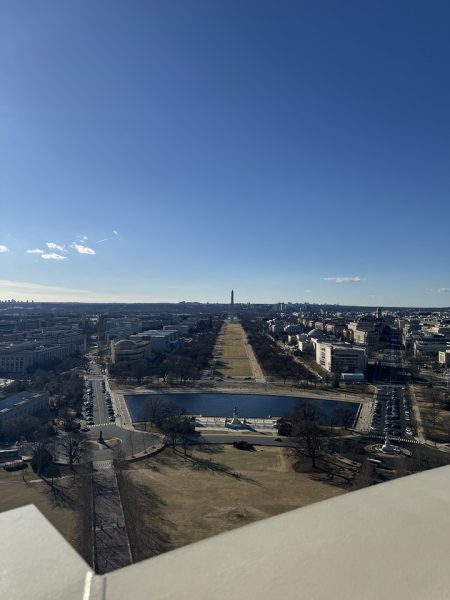Roving Eye Film Festival
RWU often sponsors different events that broaden students’ horizons on media forms or different cultural perspectives. One event that captures this intent occurred from Nov. 7 to Nov. 12, entitled “RWU Film & Speaker Series on the Jewish Experience: Arts and Culture: Shaping the Future, Reflecting the Past.”
Different films were shown on various days and focused on influential Jewish people in history and their creations. This event was part of the continuous Roving Eye Film Festival.
On the night of Nov. 8, two different film screenings were shown in GHH 01. The first was a short film, called “Hope Dies Last,” directed by Ben Price. This feature was about a barber who cut hair in Auschwitz. There was no dialogue throughout the entire film, but there were heavy sound effects that indirectly conveyed the nerves of the barber who constantly tapped his tools on the metal tray and worked to make sure everything was perfect. Without captions throughout the film, it was truly left up to interpretation until the last slide when the story was revealed. The barber was a Polish prisoner who was forced to cut the hair of his Commander almost every week for 4 years, and they never once spoke. The short held power despite the few minutes that it contained.
The next film that was shown on that night was entitled, “After Auschwitz: The Stories of Six Women,” directed by Jon Kean. This was a post-Holocaust documentary that followed six women as they tried to move past the trauma that they faced onto better lives. These women were Erika Jacoby, Lili Majzner, Linda Sherman, Renna Drexler, Eva Beckmann, and Renee Firestone.
All in their teenage years or early 20s when they were liberated, these women had already encountered so much tragedy, between starvation, witnessing countless deaths, and losing beloved family members. Once they were freed, the transition back into a regular life was in absolutely no way easy.
Sherman stated that by the time they got out, “I was a skeleton and physically, completely broken.” Eva also acknowledged that they had been through so much and did not know how to start over again.
“No one survived, and everything is gone, so where do you start?” Beckmann said. They did not have homes anymore and wanted to look for loved ones but did not know where to begin. Eventually, the women made their way to the United States, where they were elated to be free from the torture they faced in the concentration camps and the initial poor reactions they received when they were released in Europe.
Sunday, Nov. 12 featured a film that was more positive in nature. It was called “Monkey Business: The Adventures of Curious George’s Creators,” directed by Ema Ryan Yamazaki. The movie captured the journey of the Jewish authors Hans and Margret Rey, the creators of the renowned children’s books involving Curious George. The married couple drafted the character, Hans being the artist and Margret the storyteller, as they developed different stories and drawings in the height of wartime conflict in Paris. Hans loved the zoo and had experience in the Amazon jungle traveling through Brazil, which arguably contributed to his love for monkeys.
He once mentioned, “We are in the monkey business you might say.”
The couple had been paid for some of their books in France, but after they fled the country, they tried to seek more opportunities for their books in America. Soon after, Curious George became a character who was known and loved by children nationwide.
Reverend Nancy Soukup and George Marshall helped to host the different screenings, and were very passionate about the work being featured.
“We are so excited because this event is curated by students and these are the latest films in the Jewish Global Experience,” Soukup said.






